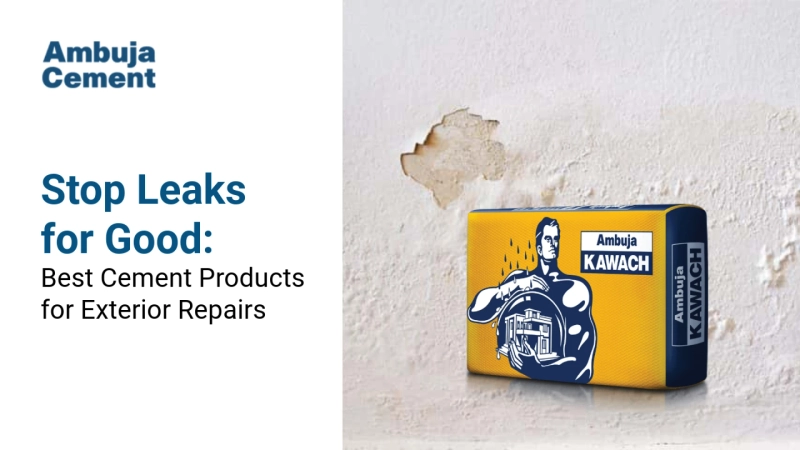If you’ve ever noticed water stains on your basement wall or worried about moisture creeping into your home walls, you’re not alone. Water damage can be one of the most frustrating and costly issues homeowners face, and it often starts with the tiniest cracks or pores in your concrete. That’s where waterproof cement steps in.
But is it really worth the extra cost? When exactly should you use it? Let’s break it down so you can make an informed decision and protect your home for years to come.
What Is Waterproof Cement, Really?
In simple terms, waterproof cement is a special type of cement that’s been formulated to reduce its natural porosity. Unlike regular cement, which is highly porous and lets water slowly seep through over time, waterproof cement fills in those microscopic gaps. This makes it ideal for areas exposed to prolonged moisture, in spaces like basements, bathrooms, terraces, and retaining walls.
Products like Ambuja Kawach are at the forefront of this innovation. Designed to resist water penetration and reduce damage from aggressive weather or groundwater, Ambuja Kawach acts as a shield, improving both the strength and durability of the structure it supports.
Where Does Waterproof Cement Make the Most Sense?
If you’re building or renovating, here are the most critical areas where waterproofing cement can add serious value:
1. Basements and Below-Ground Foundations
Basements are naturally prone to dampness because they’re surrounded by soil, which holds moisture. A typical cement mix just won’t cut it here. Using waterproof cement ensures that water won’t leak through and cause mould, musty odours, or long-term structural issues.
2. Bathrooms and Wet Areas
A bathroom is the only space that is always exposed to water–daily showers, pipe leaks, and even steam. Normal, low-quality cement can soak up this moisture like a sponge over time, leading to cracks or lose tiles. Waterproof cement keeps everything sealed tightly, preventing long-term deterioration.
3. Roofs and Terraces
Flat rooftops and terraces often face stagnant water during the monsoon or due to poor drainage. If not sealed properly, this can seep through to the rooms below. A layer of waterproof cement under your tiles or concrete finish can help avoid costly water damage repairs later.
4. Water Tanks and Pools
Storage tanks, fountains, and even swimming pools need cement that can truly hold water without letting it escape into surrounding structures. Ambuja Kawach, with its enhanced durability and water-repelling properties, is ideal in these conditions.
How Is It Different from Waterproof Concrete?
Now, here's where people get confused: waterproof cement and waterproof concrete are not the same thing, though they work together brilliantly.
Waterproof concrete is concrete that includes waterproof cement in its mix, but also adds other additives and treatments to ensure zero permeability.
Waterproof concrete also includes finely ground materials like fly ash or special admixtures that densify the mix. It forms a complete internal protection against water, especially in more critical applications like submerged marine structures or high-pressure containment tanks.
For your home, you may not always need the full waterproof concrete package, but using waterproof cement in the right places can give you a huge leg up against moisture-related damage.
The Benefits: Why It’s Worth It
Still on the fence? Here are a few advantages of using waterproof cement in your home:
- Prevents Costly Repairs: Water seepage leads to cracked walls, paint damage, swollen woodwork, and mould. Waterproof cement stops the problem before it starts.
- Improves Lifespan: By keeping water out, your structural elements like foundations and roofs last significantly longer.
- Ideal for Indian Conditions: High groundwater levels, unpredictable monsoons, and humid climates mean your home needs every bit of protection it can get.
- Works with Additives: Cement products like Ambuja Kawach are designed to be mixed easily with regular concrete work, adding water resistance without altering construction workflows.
- Eco-Friendly: Reduced need for future repairs means a smaller carbon footprint in the long run.
Any Downsides?
No product is perfect, of course. Waterproof cement tends to be slightly more expensive than standard cement. However, when you factor in the money saved on future repairs, repainting, and maintenance, it’s often worth the upfront investment.
Also, proper application is essential. Even the best waterproof cement won’t help much if there are gaps in your construction or poor workmanship. Make sure your contractor understands how to use it effectively.
Where Can You Get It?
If you’re looking for trusted options, Ambuja Kawach is one of the top picks in the Indian market. It’s specially engineered to fight moisture, weathering, and aggressive chemicals in the environment. Plus, it improves workability, making it a favourite among professionals and DIY builders alike.
Whether you’re planning to build a new home or upgrade parts of your current one, it’s a smart idea to ask your contractor or supplier about integrating Ambuja Kawach into moisture-prone areas.
Final Verdict: Is Waterproof Cement Worth It?
Absolutely, especially if you live in a region with heavy rain, high humidity, or rising groundwater levels. Whether it’s your basement, bathroom, or terrace, adding waterproof cement like Ambuja Kawach gives you long-term protection and peace of mind.
And when paired with waterproof concrete solutions in high-risk zones, you’re investing in the structural health of your home. It’s one of those upgrades that quietly does its job while saving you from a future full of leaks, damp spots, and unplanned repair bills.


